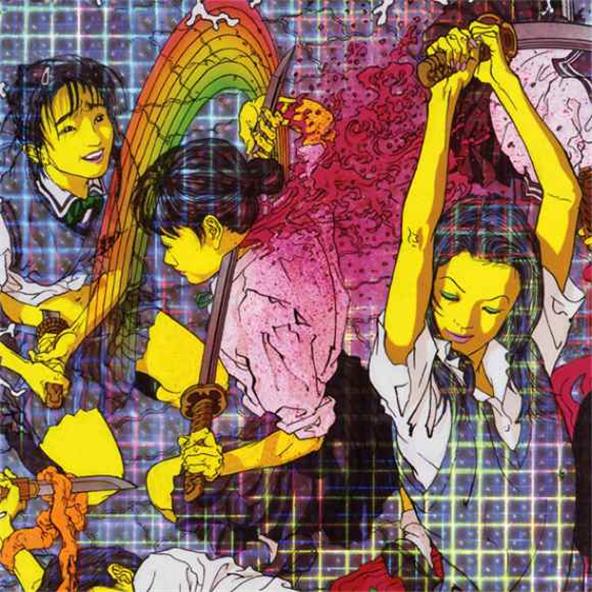Abstract pop seems like an oxymoron. The latter implies a basic format (like the verse-chorus-verse structure) or at least a repeated use of recognizable hooks and melodies, whereas “abstraction” typically entails either a lack of concern for structure, melody, and “catchiness” or the employment of these tropes in ways that defy clear patterns or other organizational signifiers. It’s the difference between, say, Julianna Barwick’s “Cloak” and Imogen Heap’s “Hide and Seek.” Both songs are repetitive, beatless, and largely a capella, but I’d only classify the latter as an example of “pop music.”
That said, Laurel Halo’s latest release, Quarantine, deftly qualifies as “abstract pop music.” Digital detritus, stray tones, and orphaned drones coalesce to form a constantly evolving electronic backdrop for Halo’s surprisingly discernible yet meaningfully ambiguous lyrics. Take “Years,” for instance. A distant, static-drenched synth arpeggio sputters and restarts like an old car engine; before long, Halo addresses a (presumably ex-) lover: “I will never see you again/ You’re mad ‘coz I will not leave you alone/ Making eye contact…” And then these lyrics seem to fall back on themselves, dubbed over each other so that we can’t really make out more than a word or short phrase at any given time. Perhaps this reflects the emotional confusion that accompanies the dissolution of a relationship; perhaps Halo simply chose to do this because it sounds cool. (On a later track, “Holoday,” a chopped-and-sampled voice spits out, “Just wanna be with you,” and it doesn’t seem unrelated to the despondent pining we’ve just heard in “Years.”) A single drone and what sounds like a frightened flock of seagulls carries us into the following track, leaving us with more questions than answers.
Quarantine as a whole is like this. Except for the opening song, there’s little in the way of percussion here; lyrical phrases seem rich with inscrutable significance, like the picked-out-of-a-hat lyrics Thom Yorke used on Kid A; harmonies and counterpoints fade in and out of consciousness, while any noticeable “hooks” are presented as just another part of this amorphous cloud of noise and music. The instrumentation is chiefly electronic, in the vein of Jürgen Müller and the most accessible items in Emeralds’ catalog. For listeners who have followed Halo’s career arc thus far, Quarantine represents a marriage of the synthpop of King Felix with more ambient and, yes, abstract releases such as her spaced-out Antenna cassette and her FRKWYS collaboration with James Ferraro, David Borden, Samuel Godin, and Daniel Lopatin, both from last year.
Some of these lyrics are vaguely ominous. On “MK Ultra,” for instance, she warns that “hurricane’s always coming, so take cover…” and then I can’t make out the rest. A discordant synth tone eerily resounds in the background — whatever’s coming isn’t going. Later, another troubling revelation: “Hanging onto obsession/ I can never let go.” Despite the seeming trouble ahead, Halo remains a restless experimenter. After “MK Ultra” we’re treated to the brief “Wow” interlude, which involves her pitch-shifted and self-harmonized voice repeating the titular word for a minute or so, stretching it out and finding new cadences in its monosyllabic brevity. This is followed by “Carcass,” which dips its head in and out of murky, arpeggiating waters until Halo’s voice sings out, repeating the title in a tone that straddles the line between taunting and pleading, a disfigured siren lounging on jagged rocks of gelatinous glass. Is she rescuing us from the unstable quasi-techno of the synths below or making a prediction about our fate?
Upon first listen, I thought the album felt unfinished. Subsequent listens, however, have revealed a strangely compelling work that challenges the listener without relying on ear-splitting harshness or strict non-music machinations. The feeble piano sample on “Morcom” wouldn’t sound out of place on Oneohtrix Point Never’s Replica, another album that took a few listens to grow on me. But wherea Lopatin always seems in control of the synths at his disposal, Halo seems at once buoyed and overwhelmed by her various electronics, and it’s this central uneasiness that transfers most indelibly onto the listener. As she says on “Tumor,” “Distorted, liquid image of you/ The signal keeps cutting out, but one thing is clear/ Nothing grows in my heart/ There is no one here.” I imagine the second half of this lyric (beginning with “Nothing”) represents the person to whom Halo is speaking, rather than Halo herself.
Why? Because Quarantine shows that there’s a lot going on in Laurel Halo’s heart. Sometimes these feelings are blocky, pixelated, and alien, but they are feelings nonetheless whose impact shines through even the thickest futuristic armor. Quarantine is not a perfect exploration of the blurred lines between the human and the robotic or the traditional and the unconventional; moments like “Nerve,” filled with beeps and bloops and ambient synth pads and not much else, are a bit too numerous for my taste, especially in contrast to the rarer, more fleshed-out numbers like closer “Light + Space.” Still, this is probably among the most original and enigmatically seductive albums we’ll hear all year, and that itself is certainly an achievement worth celebrating. Halo ends the album by summing up the main contradiction of the preceding eleven songs: “Words are just words that you soon forget/ Machine stays an empty silhouette.” Here is an album that’s neither forgettable nor empty; happily, I suppose this proves Halo incorrect.

